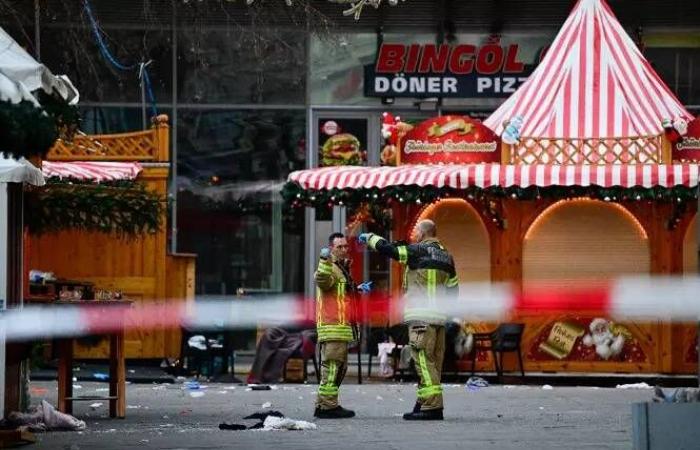
German government and security officials are to say on Monday exactly what they knew about the suspect in the deadly attack on Magdeburg Christmas marketmonitored by the police but left free.
The drama, which made five dead and more than 200 injured on December 20, could it have been avoided? “I would like to know that too,” replied Chancellor Olaf Scholz on Friday, during an interview with the t-online site.
Campaigning for his re-election two months before the early legislative elections, the social democratic head of government promised to shed light on possible “failures on the part of the authorities of Saxony-Anhalt or at federal level”.
“Repeated indications have been made over the years” about Taleb Jawad al-Abdulmohsen, he admitted.
For ten days, Germany has been wondering about the reasons which pushed this 50-year-old Saudi doctor to mow down the crowds at the Christmas market aboard a powerful BMW vehicle going at full speed.
And on possible alert faults despite the worrying signals that he had been sending for years.
A difficult personality to pin down, the trained psychiatrist expressed mixed opinions hostile to Islam, his anger against German immigration officials and his support for far-right conspiracy stories about the “Islamization” of Europe.
House clos
While he is still in pre-trial detentionthe German Minister of the Interior Nancy Faeser, that of Saxony-Anhalt, officials of the authorities and the heads of the secret services must answer questions from deputies of a parliamentary committee on Monday.
Scheduled for 1 p.m. local time (12 p.m. GMT), the session of the Internal Affairs Committee will be held behind closed doors, a sign of a sensitive issue.
The investigation “will continue at full speed”commented on Saturday the Minister of the Interior of Saxony-Anhalt, Tamara Zieschang (CDU, conservatives), stressing that it also concerned the functioning of the security system of the Christmas market.
Mme Zieschang “has to answer a lot of questions”said the leader of the Social Democratic Party (SPD) Lars Klingbeil on Sunday, thus trying to reverse the pressure on the right, at the head of the region.
But if the government's responsibility is also in question, it is because the German media have revealed countless publications by the suspect on social networks, notably uttering threats of violence against German citizens and politicians.
A decade earlier, in 2013, he was fined in Rostock, in northeastern Germany, for “disturbing public order” and “threats to commit crimes.”
More recently, Saudi Arabia asked Berlin for his extradition, after repeatedly warning that he “could be dangerous”a source close to the government in Riyadh told AFP.
According to the daily The world, the German police, after an assessment “of risk”, had judged last year that he did not present “particular danger”.
Two interviews
On Thursday, the Saxony-Anhalt police clarified the chronology of two oral exchanges carried out with him in this context: a first at the end of September 2023 in a police station, a second time at the beginning of October 2024 at his workplace.
Several maintenance attempts failed in December 2023, she also indicates.
The police organize such meetings with people considered to be a potential threat to make them understand that they are closely monitored and dissuade them.
The attack placed the questions of immigration and security at the heart of the campaign for the early legislative elections on February 23.
Living in Germany since 2006, Taleb Jawad al-Abdulmohsen had refugee status and thus benefited from the protection of his host country.
During a demonstration in Magdeburg, the far-right Alternative for Germany (AfD) party, which could double its score compared to the last elections, demanded “close the borders” facing the “crazy people from all countries”.
“We tolerate too many people in Germany who do not want to integrate,” conservative Friedrich Merz, the big favorite in the polls to become the future chancellor, said on Friday. He recommends making evictions easier “even below the threshold of established criminal offenses”.
Olaf Scholz, for his part, recalled that the right-wing opposition had blocked in October part of the bill toughening the country's migration policy, which provided for additional investigative powers for the police.





